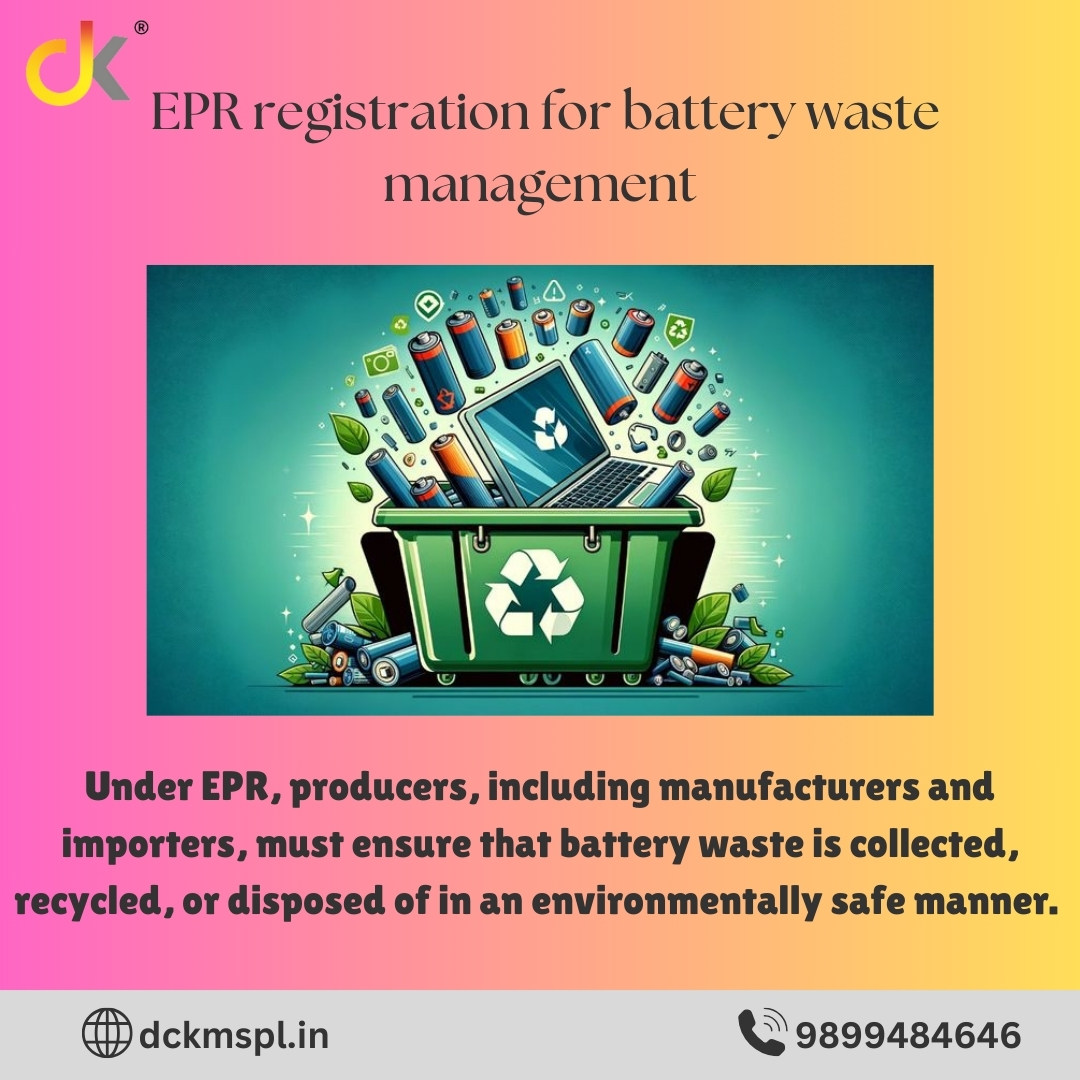As the world grapples with increasing environmental challenges, proper waste management has become a critical concern. Among the various types of waste, battery waste poses unique risks due to the presence of hazardous substances such as lead, cadmium, and mercury. Improper disposal of batteries can lead to environmental pollution and pose serious health risks. To address these challenges, the concept of Extended Producer Responsibility (EPR) has gained prominence as an essential framework for managing battery waste. This article delves into the importance of EPR registration for battery waste management, its benefits, and the steps involved in the process.
What is EPR for Battery Waste Management?
EPR registration for battery waste management is a policy approach that shifts the responsibility of managing the end-of-life stage of a product, such as batteries, to the producer. Producers, including manufacturers, importers, and brand owners, are accountable for the collection, recycling, and proper disposal of battery waste. The objective of EPR is to reduce the environmental impact of batteries by promoting their safe handling and encouraging the recycling of valuable materials found in batteries.EPR ensures that producers take an active role in minimizing the hazardous effects of battery waste, making it an essential component of sustainable waste management.
Why is EPR Registration Necessary for Battery Waste?
Batteries are used in a wide array of products, from household electronics to industrial machinery. When disposed of improperly, the toxic substances in batteries can contaminate soil, water, and air, leading to serious environmental degradation. EPR registration is critical for the following reasons:
- Environmental Protection: Batteries contain harmful chemicals that, when not disposed of correctly, can leach into the environment and cause pollution. EPR mandates safe disposal and recycling, preventing the release of toxic substances.
- Health and Safety: Exposure to battery waste can result in various health issues, including respiratory problems and neurological disorders. Proper waste management through EPR reduces the risk to human health by ensuring that batteries are handled and disposed of safely.
- Resource Recovery: Many batteries contain valuable metals like lithium, cobalt, and nickel, which can be recovered and reused. EPR encourages the recycling of these materials, reducing the need for raw material extraction and promoting resource efficiency.
Benefits of EPR Registration for Battery Waste Management
1. Reduction in Environmental Pollution
By ensuring the proper collection, recycling, and disposal of batteries, EPR plays a crucial role in reducing environmental pollution. When hazardous substances from batteries are prevented from entering the ecosystem, it leads to cleaner air, water, and soil, contributing to overall ecological balance.
2. Encourages Recycling and Reuse
EPR fosters a culture of recycling and reuse by encouraging producers to take responsibility for their products’ end-of-life stage. The valuable metals found in batteries can be extracted and reused, reducing the demand for virgin materials and conserving natural resources.
3. Improves Corporate Social Responsibility (CSR)
Companies that comply with EPR demonstrate a commitment to sustainable practices and social responsibility. This can improve their brand image and reputation, making them more appealing to environmentally conscious consumers and stakeholders.
The EPR Registration Process for Battery Waste
The EPR registration process for battery waste management is straightforward but requires attention to detail. Producers must follow specific steps to comply with regulatory requirements. Here’s an overview of the process:
1. Applying for EPR Authorization
Producers must apply for EPR authorization with the appropriate environmental regulatory authority. The application typically includes details such as the company’s waste management plan, collection methods, and recycling strategies.
2. Reporting and Monitoring
Producers are required to submit periodic reports to the regulatory authorities, detailing the quantity of battery waste collected and the methods used for recycling. Regular audits may also be conducted to verify compliance with EPR regulations.
3. Renewal of EPR Registration
EPR registrations are valid for a specific period, after which they must be renewed. Producers need to review their waste management plans and update them as necessary to comply with evolving regulations.
Conclusion
EPR registration for battery waste management is a crucial initiative in the global effort to reduce environmental pollution and promote sustainable practices. By holding producers accountable for the end-of-life management of their products, EPR encourages responsible production, recycling, and disposal of batteries. This not only helps protect the environment and human health but also supports resource conservation and corporate responsibility. For producers, embracing EPR registration is not just a legal obligation—it is an opportunity to demonstrate leadership in environmental sustainability. By actively participating in battery waste management, companies can contribute to a cleaner, greener future for generations to come.

